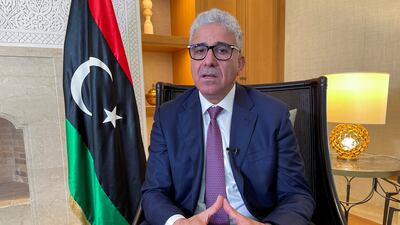Libyan Prime Minister Fathi Bashagha has distanced himself from a first-person article published under his name by The Times newspaper, saying he was “surprised” by the content.
In a tweet from his verified account on Wednesday, he said the British paper’s opinion piece was “mere lies” and “fake news”.
The Times rejected Mr Bashagha's accusation in a statement to The National.
"We stand by our publishing of this article and Fathi Bashagha's staff have confirmed to us it is accurate."
In the article, under the headline “Libya wants to stand with Britain against Russian aggression,” Mr Bashagha appeared to sharply criticise the Russian invasion of Ukraine.
“I was horrified when I saw Vladimir Putin’s invasion of Ukraine. As a Libyan, I know what it is like to see foreign forces enter your country illegally,” the prime minister’s op-ed said.
The article went on to say that Libya was, like Ukraine, fighting for freedom and safety. The writer renewed his pledge to kick foreign mercenaries out of Libya.
“The western world, led by Britain, is now taking the fight to Russian military bullying in Ukraine and across the world. They have been good to us – our British, French and American friends helped us keep the scourge of ISIS at bay. But I want to remind Britain that Libya, too, is a frontline in this fight with Russia,” he wrote.
Thousands of mercenaries, Turkish soldiers and their Syrian militia allies as well as other foreign fighters have operated inside Libya for years.
Last October, military representatives from the Government of National Accord and opposition military forces agreed on a comprehensive action plan.
It was signed at a ceremony hosted by the UN in Geneva as the cornerstone for the gradual withdrawal of mercenaries and foreign forces in line with a ceasefire agreement.
Mr Bashagha questioned the integrity and credibility of The Times, which has been publishing since 1785.
“I was surprised by an article attributed to me and published in the English newspaper The Times. I wish that this respected and time-honoured newspaper had fact-checked reports first and stuck to accuracy in order not to publish fake news,” he tweeted.
Libya has been fractured for years and was fighting a civil war until a ceasefire led to talks and efforts to reunify the country. But tension and division continue.
Mr Bashagha, a former Libyan air force pilot, was catapulted into politics after being made interior minister at the GNA in 2018.
In February this year, he was appointed by Libya’s eastern-based parliament. He was supposed to replace Prime Minister Abdul Hamid Dbeibah, who has refused to step aside and called Mr Bashagha’s nomination illegitimate.
Mr Dbeibah was appointed in 2020 after a UN-led power-sharing agreement with the mandate to set the stage for the country’s first presidential elections.
They were due to be held at the end of last year, but the voting process was derailed when neither side in the oil-rich country could agree on laws to govern the vote or the constitutional framework.
The current legislative and political stand-off runs the risk of dividing the country again into two main political entities, similar to its state in 2014, when a parallel government emerged and fought against the Tripoli-based GNA until the ceasefire in October 2020.
Libya’s political situation has been highly volatile since December 24, when the country failed to hold its first presidential election.
In February, the UN secretary general’s special adviser on Libya, Stephanie Williams, told The National that every Libyan institution suffered from a crisis of popular legitimacy.


